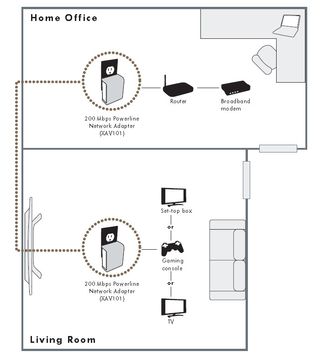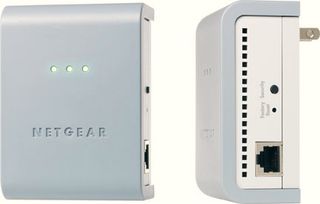Which Networking Technology Is Right For Your Home?
Powerline AV Ethernet Adapter Kit (XAVB101)
As mentioned earlier, you might not have coax or Ethernet in your walls, and you might have wireless dead spots throughout your house, but odds are good that you’ve got at least one electrical outlet in every room. A powerline networking kit takes an incoming Ethernet connection and, using a “wall wart” adapter, converts the data feed into a modulated carrier signal that runs throughout the power wiring network. Another wall wart on the receiving end converts the signal back for passing on to the network switch or other LAN devices. Essentially, powerline kits are fancy Ethernet extension cables.

Netgear’s Powerline AV Ethernet Adapter Kit advertises 200 Mb/s bandwidth, but the HomePlug AV spec on which the product is based tops out with a theoretical rate of 189 Mb/s. As we all know, theoretical specs are essentially useless, and if there’s any doubt on this point, know that the Ethernet port on these adapters is 10/100, not gigabit. The point is that Netgear rates the kit as being “fast enough to stream HD video.” That sounds like one stream, but we’ll see how things shake out. Perhaps we’ll be pleasantly surprised.
To set up the XAVB101, you simply plug one adapter into a wall outlet and then connect it to the router/switch. Next, plug the other one into the outlet closest to your target device (PC, game console, etc.) and connect the target. The two wall warts will associate within a few seconds, and that’s that. If you want to encrypt the connection between the two, press the security button on the wart’s right edge, above the RJ45 jack, and the pair will protect all transmissions with 128-bit AES encryption.

You can tweak the kit slightly by using Netgear’s bundled utility. For instance, you can apply a passphrase for the AES encryption. You can also turn off the LED data rate indicators. We had no trouble with range when testing the powerline gear, and Netgear rates if for homes of up to 5,000 square feet.
Stay on the Cutting Edge
Join the experts who read Tom's Hardware for the inside track on enthusiast PC tech news — and have for over 25 years. We'll send breaking news and in-depth reviews of CPUs, GPUs, AI, maker hardware and more straight to your inbox.
Current page: Powerline AV Ethernet Adapter Kit (XAVB101)
Prev Page Official 5 GHz Wireless Expectations Next Page MoCA Coax-Ethernet Adatper Kit (MCAB1001)-
rebturtle I'll be bookmarking this article for customers who tell me, "No, I don't want a wired LAN, I picked up this wireless router at WalMart....."Reply -
neiroatopelcc I like the netgear floorplan "Stairs to go upstairs" ... great!Reply
And nice article btw. Imo I'd have put the first rant about netgear after the section detailing that you're using it, so it looks more like an explanation than an advertisement (page 1) though. -
anamaniac Thank you for the article.Reply
I decided to skip getting a switch (as I still want interent on all connected devices anyways), and grabbed a 2.4/5GHz 820.11n gigabit router...
Has done well for me, just too bad my PSP can't use wireless N.
I've been tempted (and almost did) put new holes in my walls to drag my cat6 cables around my house (I only grabbed cat6 over cat5e because of the colour of the cables at my shop, however I do somewhat regret it because cat5e is a lot more flexible). -
neiroatopelcc Q: can regular people like I download the zap benchmark software somewhere? I'm the guy being blamed if our corporate network in two towns breaks down, and lately I've been hammered for unstable wireless network and can't find any cause for this. Would like to see minimum performance for our access points (got about 40 meru aps with dual radio and a,b,g and n concurrently).Reply -
Spanky Deluxe Gigabit ethernet throughout the house running through a gigabit switch in the garage here with 802.11g for the laptops until I get round to replacing the router we got with our broadband supplier with an Airport Extreme.Reply
Luckily the previous owner of the house was a network engineer and had left all the wiring throughout the house. I just hooked up a cheap second hand gigabit switch off eBay and have been loving it ever since. -
NicNash If you connect a power-line connector from a computer that is also connected to a wireless n network, to that router... will it use both adapters at same time? or whichever to provide best speed?Reply
weird thought.. but yea -
NicNash btw great article on these lesser known technologies. this article is worth its weight in gold to those who careReply -
neiroatopelcc nicnashIf you connect a power-line connector from a computer that is also connected to a wireless n network, to that router... will it use both adapters at same time? or whichever to provide best speed? weird thought.. but yeaDepending on the OS, but if you're running a standard microsoft os, it'll use whichever it detects a gateway on first. Has nothing to do with which is fastest or most reliable.Reply
Type route print in cmd if you want to see what it uses
Most Popular


